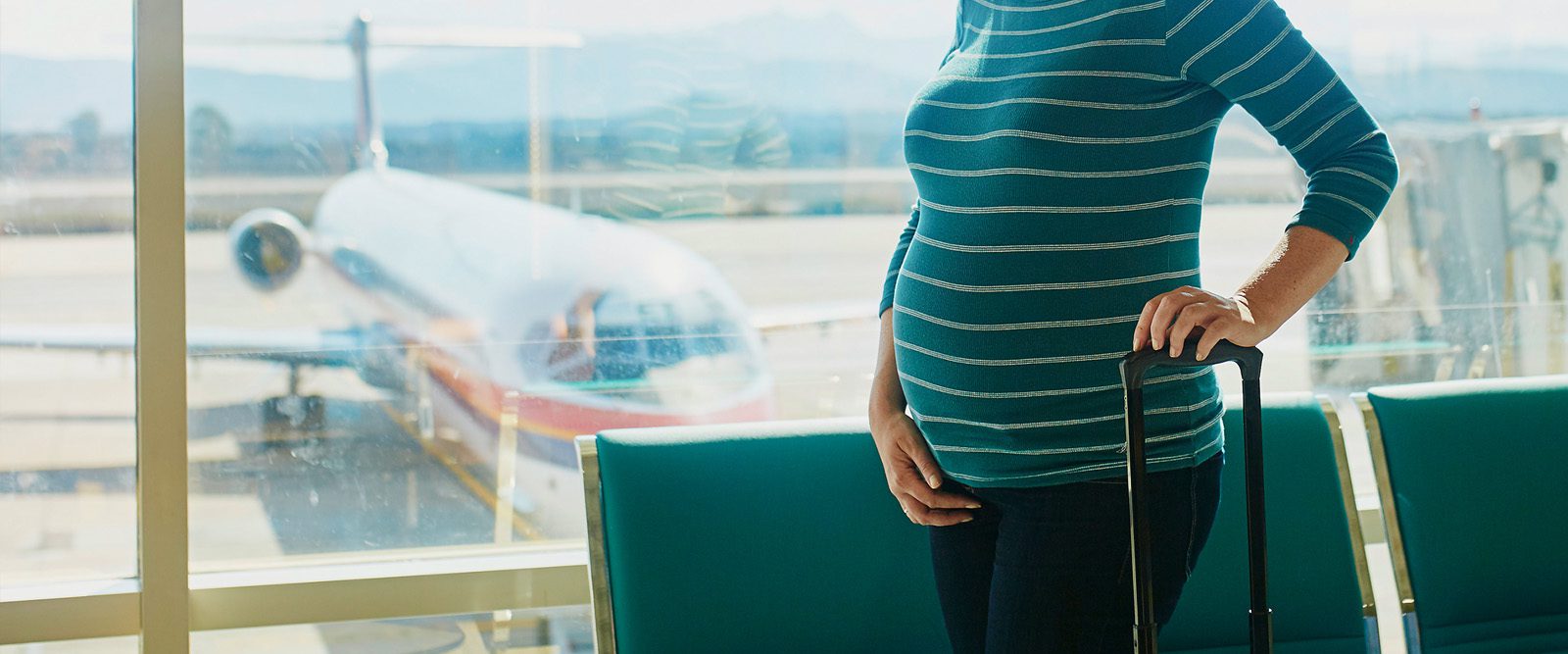Traveling While Pregnant: 9 Expert Tips
An OB-GYN shares advice about traveling while pregnant and what you can do to stay safe.

For expectant mothers, traveling can be stressful and introduce a unique set of considerations and uncertainties. But with thoughtful preparation, they can ensure their comfort and safety as well as the baby’s safety.
“For those with a low-risk pregnancy, travel is generally considered safe,” says Dr. Cassandra Simmons, division chief of General Obstetrics & Gynecology at NewYork-Presbyterian Westchester and NewYork-Presbyterian/Columbia University Irving Medical Center. “Most patients should feel comfortable benefiting from the positive aspects of travel and be able to enjoy their trip.”
Health Matters spoke with Dr. Simmons to learn what advice she has for people traveling while pregnant.

Dr. Cassandra Simmons
1. Check in with your doctor before traveling.
Travel is not recommended for those with certain complications, such as preeclampsia, preterm labor, or pre-labor rupture of membranes (PROM).
According to Dr. Simmons, there may be slightly higher risk associated with traveling in the first trimester for patients with a greater risk of bleeding and the third trimester (when you’re closer to delivery). Most doctors advise a pregnant person not to fly by commercial flight after 36 weeks of pregnancy or by international after 34 weeks. In fact, most airlines restrict air travel for pregnant people if they are close to their due date. “As one approaches their due date, the risk of going into labor is too high, as medical or obstetrical care in flight is limited or not available at all,” says Dr. Simmons.
2. Plan for unexpected situations.
Locate the closest obstetric healthcare provider and hospital, regardless of where you’re traveling. “When traveling domestically and internationally, you should ensure that there are options for obstetric care near your destination so that you have a place to go if you experience unexpected symptoms related to your pregnancy while traveling,” says Dr. Simmons.
3. Stay up to date on vaccinations.
Make sure you’re up to date on your recommended vaccines in pregnancy, including RSV, influenza, TDAP, and COVID vaccines. If you plan to travel internationally, keep in mind that some countries require specific vaccines. While some vaccines are safe during pregnancy, others may not be. “Communicate with your provider as to what vaccines are recommended based on the country to which you plan to travel,” says Dr. Simmons.
4. Take extra precautions when traveling internationally.
It’s best to avoid areas with a high risk of infectious diseases — such as malaria or Zika, two mosquito-borne diseases. Check with a travel medicine specialist for current information on countries where Zika and malaria are reported. Dr. Simmons reminds pregnant people that “the main way to mitigate risk with regard to malaria and Zika is to avoid infection altogether.”
If you plan travel to areas where malaria and Zika are reported, you may benefit from use of EPA-approved, long-acting insect repellents, many of which are safe for use while pregnant. Wear long-sleeved shirts and pants to protect against mosquito bites. If you’re going to a malaria-endemic area, your primary doctor will likely prescribe anti-malarial pills that are safe during pregnancy.
If you’re in a country where tap water is unsafe to drink, remember to stick with bottled water — even for things like brushing your teeth — to reduce the risk of gastrointestinal (GI) infection.
5. Wear your seat belt low and snug across your hips, not over your belly.
For comfort and safety, avoid placing your seat belt on top of your pregnant abdomen,” says Dr. Simmons. It should be worn under your belly, just above your hips.
6. If you’re on a long flight or long car ride, get up and move often to help prevent blood clots.
During pregnancy, you are at an increased risk of developing what is called deep vein thrombosis (a blood clot in a deep vein in the body, like in the leg). Sitting for too long, as during a car or plane ride, can exacerbate blood clots, so. anything you can do to improve blood flow helps. For flights, stand and walk up and down the aisle of the plane every hour. Choosing an aisle seat may make it easier to get up often.
For long car rides, try and stop every hour to stretch your legs. If you can’t get up and walk around, “even calf raises in your seat help with circulation when you are sedentary during travel,” says Dr. Simmons.
“Wearing compression socks is another way to promote circulation while on a long trip,” she adds. These tight-fitting socks reach up to the knees and help with blood flow and circulation.
Most patients should feel comfortable benefiting from the positive aspects of travel during holidays — by car or by plane — and be able to enjoy their time with friends and family.
Dr. Cassandra Simmons
7. Be prepared with comfortable clothing, snacks, water, and anti-nausea medicines.
Whether you have a two-hour drive or a six-hour flight ahead of you, wear comfortable clothing and shoes. Keep snacks and water on hand as well, “to stay hydrated and keep up with the metabolic demands of being pregnant,” says Dr. Simmons. And if you’re feeling nauseous or have GI discomfort while traveling, ask your doctor about prescription and over-the-counter medications that are considered safe to take while pregnant.
8. Mask up and use hand sanitizer.
“I advise my pregnant patients to wear a mask when traveling or when in the presence of large crowds, as an added precaution for safety for themselves and their unborn babies,” says Dr. Simmons. Because COVID, RSV, and the flu are all airborne viruses — meaning they spread through tiny respiratory droplets in the air — wearing a mask adds a layer of protection. You may also want to ask family members, friends, and loved ones to take precautions and be cognizant when planning large gatherings. For example, if someone is sick, they should keep their distance.
And don’t forget to wash your hands and use hand sanitizer often. Keep sanitizer handy, especially if you are traveling with young children. Keep their hands sanitized as well to help keep your family safe.
9. Upon arrival, avoid any unsafe activities.
“It’s important that you enjoy your planned activities, but try and avoid adventures that may significantly increase your risk of trauma while pregnant,” says Dr. Simmons. For example, if you’re going to an amusement park or participating in an activity that could put you at risk of falling or for sudden jerky movements (like skiing or other high-impact sports), it’s important to proceed cautiously. Stick to lower-impact exercises and sports like jogging, walking, or swimming.
Cassandra Blot Simmons, M.D., M.B.A. is chief of the Division of General Obstetrics & Gynecology at NewYork-Presbyterian Westchester and NewYork-Presbyterian/Columbia University Irving Medical Center. She is also an assistant professor of obstetrics and gynecology at Columbia University Vagelos College of Physicians and Surgeons. Dr. Simmons specializes in women’s gynecological health and obstetrics care before, during, and after pregnancy.
Additional Resources
Learn more about women’s health at NewYork-Presbyterian.
